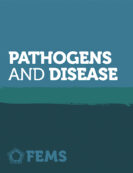FEMS Microbiology Letters Poster Prize: Manuela Fuchs
Anaerobe 2021: The Microbiota and Beyond

FEMS Microbiology Letters awarded one poster prize at the Anaerobe 2021: The Microbiota and Beyond, a meeting of the Microbiology Society and the Society for Anaerobic Microbiology (15–16 July 2021). Congratulations to Manuela Fuchs from the University of Wuerzburg (Germany), who was awarded the Poster Prize for her poster Global discovery of Hfq-associated sRNA-target networks in C. difficile.
Read our interview with Manuela about her research below:
What is your current position, and what was your scientific journey to get there?
Following, my Bachelor Thesis at the Helmholtz Centre for Infection Research and my Master Thesis at the Robert Koch Institute, I joined the research group of Franziska Faber at the Institute for Molecular Infection Biology, University of Wuerzburg. We are interested in the RNA biology of C. difficile with my PhD project focusing on the well-known RNA binding protein Hfq and its target spectrum in C. difficile.”
Could you describe the research your poster covered?
In Gram-negative species, the function of many small regulatory RNAs (sRNAs) is mediated by the RNA chaperone Hfq, a RNA binding protein that facilitating the base-pairing between sRNAs and their target mRNAs. These interactions may affect transcription, translation and/or mRNA stability thereby influencing bacterial physiology and virulence.
By using high throughput RNA-sequencing technologies, we were able to provide the first example of extensive Hfq-dependent post-transcriptional regulation in a gram-positive bacterium. Additionally, we characterized a newly identified sRNA-mRNA interaction by describing a regulatory function of sRNA CDIF630nc085 in ethanolamine utilization, an abundant intestinal carbon and nitrogen source known to impact C. difficile pathogenicity.”
What do you hope to focus your research on in the future?
In the near future, my PhD project will be focusing on functionally characterizing additional sRNA-mRNA interactions that may affect C. difficile pathogenicity, since we have barely scratched the surface so far. After completing my PhD, I would like to continue research in infection biology, as I think it is a highly interesting and relevant field of research.”
–
We use income from the FEMS Journals to fund grants, awards, and projects, and to support our knowledge sharing events and initiatives. Consider publishing your research with our journals to help the global microbiology community.
All but one of the FEMS journals are fully open access (OA), with one journal, FEMS Microbiology Letters, offering free-to-publish and OA options. Open access is key to supporting the FEMS mission of disseminating high quality research as widely as possible: when high quality, peer reviewed sound science is open access, anyone, anywhere in the world with an internet connection, can read it.







